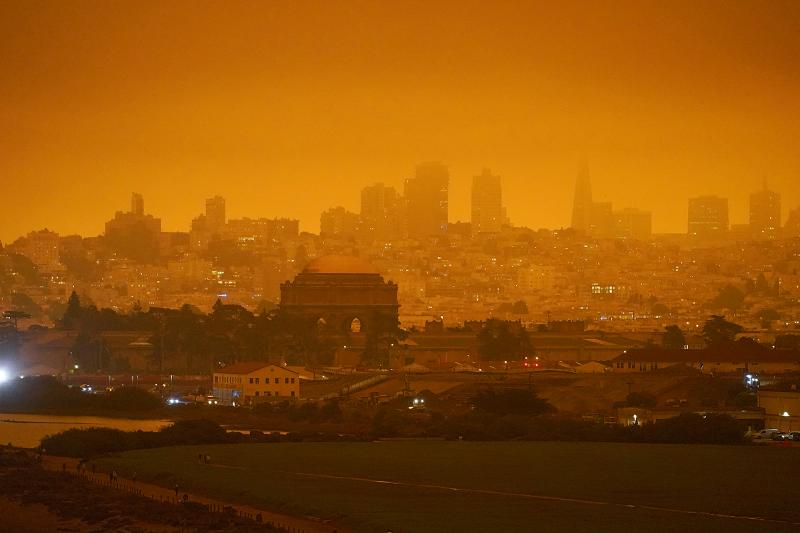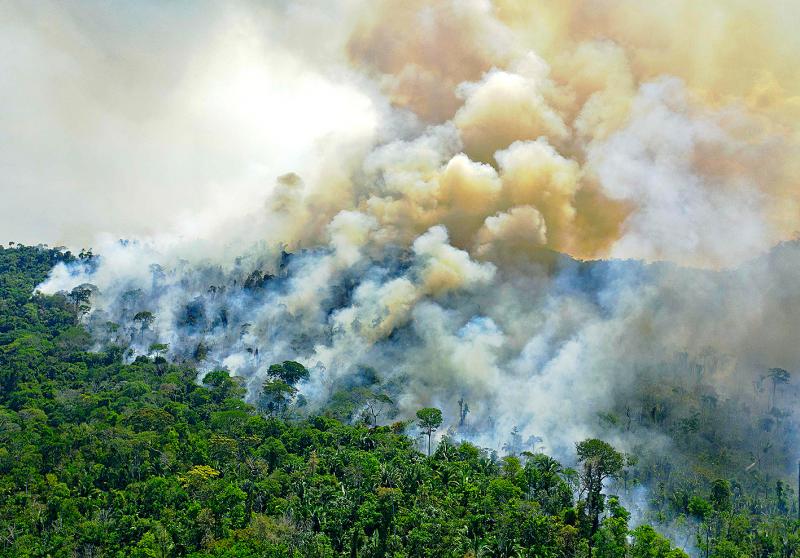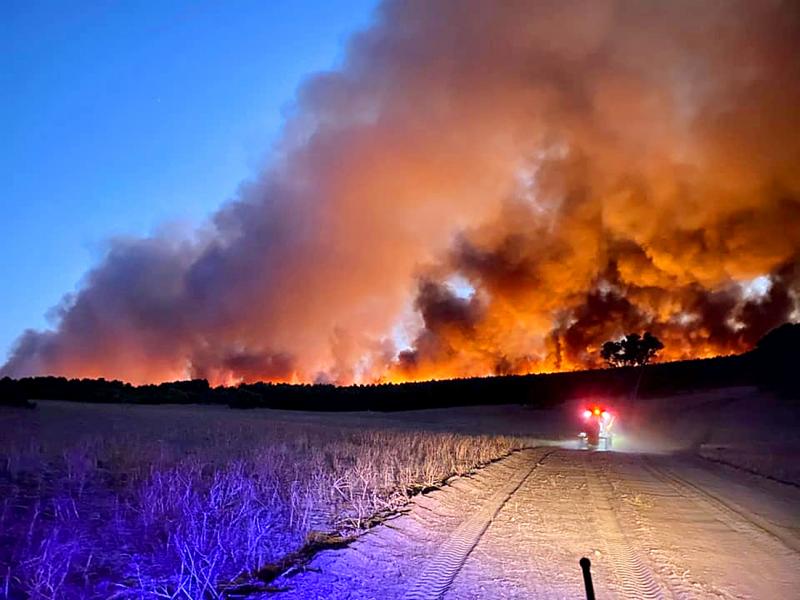The planet is facing a “ghastly future of mass extinction, declining health and climate-disruption upheavals” that threaten human survival because of ignorance and inaction, according to an international group of scientists, who warn people still haven’t grasped the urgency of the biodiversity and climate crises.
The 17 experts, including Prof Paul Ehrlich from Stanford University, author of The Population Bomb, and scientists from Mexico, Australia and the US, say the planet is in a much worse state than most people — even scientists — understood.
“The scale of the threats to the biosphere and all its lifeforms — including humanity — is in fact so great that it is difficult to grasp for even well-informed experts,” they write in a report in Frontiers in Conservation Science which references more than 150 studies detailing the world’s major environmental challenges.

Photo: AP
The delay between destruction of the natural world and the impacts of these actions means people do not recognize how vast the problem is, the paper argues. “[The] mainstream is having difficulty grasping the magnitude of this loss, despite the steady erosion of the fabric of human civilization.”
The report warns that climate-induced mass migrations, more pandemics and conflicts over resources will be inevitable unless urgent action is taken.
“Ours is not a call to surrender — we aim to provide leaders with a realistic ‘cold shower’ of the state of the planet that is essential for planning to avoid a ghastly future,” it adds.

Photo: AFP
Dealing with the enormity of the problem requires far-reaching changes to global capitalism, education and equality, the paper says. These include abolishing the idea of perpetual economic growth, properly pricing environmental externalities, stopping the use of fossil fuels, reining in corporate lobbying and empowering women, the researchers argue.
The report comes months after the world failed to meet a single UN Aichi biodiversity target, created to stem the destruction of the natural world, the second consecutive time governments have failed to meet their 10-year biodiversity goals. This week a coalition of more than 50 countries pledged to protect almost a third of the planet by 2030.
An estimated one million species are at risk of extinction, many within decades, according to a recent UN report.

Photo: Reuters
“Environmental deterioration is infinitely more threatening to civilization than Trumpism or COVID-19,” Ehrlich told the Guardian.
In The Population Bomb, published in 1968, Ehrlich warned of imminent population explosion and hundreds of millions of people starving to death. Although he has acknowledged some timings were wrong, he has said he stands by its fundamental message that population growth and high levels of consumption by wealthy nations is driving destruction.
He told the Guardian: “Growthmania is the fatal disease of civilization — it must be replaced by campaigns that make equity and well-being society’s goals — not consuming more junk.”
Large populations and their continued growth drive soil degradation and biodiversity loss, the new paper warns. “More people means that more synthetic compounds and dangerous throwaway plastics are manufactured, many of which add to the growing toxification of the Earth. It also increases the chances of pandemics that fuel ever-more desperate hunts for scarce resources.”
The effects of the climate emergency are more evident than biodiversity loss, but still, society is failing to cut emissions, the paper argues. If people understood the magnitude of the crises, changes in politics and policies could match the gravity of the threat.
“Our main point is that once you realize the scale and imminence of the problem, it becomes clear that we need much more than individual actions like using less plastic, eating less meat or flying less. Our point is that we need big systematic changes and fast,” Professor Daniel Blumstein from the University of California Los Angeles, who helped write the paper, said.
The paper cites a number of key reports published in the past few years including:
— The World Economic Forum report in 2020, which named biodiversity loss as one of the top threats to the global economy.
— The 2019 IPBES Global Assessment report which said 70 percent of the planet had been altered by humans.
— The 2020 WWF Living Planet report, which warned the average population size of vertebrates had declined by 68 percent in the past five years.
A 2018 Intergovernmental Panel on Climate Change report which said that humanity had already exceeded global warming of 1 degree Celsius above pre-industrial levels and is set to reach 1.5 degree Celsius warming between 2030 and 2052.
The report follows years of stark warnings about the state of the planet from the world’s leading scientists, including a statement by 11,000 scientists in 2019 that people will face “untold suffering due to the climate crisis” unless major changes are made. In 2016, more than 150 of Australia’s climate scientists wrote an open letter to the then prime minister, Malcolm Turnbull, demanding immediate action on reducing emissions. In the same year, 375 scientists — including 30 Nobel prize winners — wrote an open letter to the world about their frustrations over political inaction on climate change.
Prof Tom Oliver, an ecologist at the University of Reading, who was not involved in the report, said it was a frightening but credible summary of the grave threats society faces under a “business as usual” scenario. “Scientists now need to go beyond simply documenting environmental decline, and instead find the most effective ways to catalyze action,” he said.
Prof Rob Brooker, head of ecological sciences at the James Hutton Institute, who was not involved in the study, said it clearly emphasized the pressing nature of the challenges.
“We certainly should not be in any doubt about the huge scale of the challenges we are facing and the changes we will need to make to deal with them,” he said.

Words of the Year are not just interesting, they are telling. They are language and attitude barometers that measure what a country sees as important. The trending vocabulary around AI last year reveals a stark divergence in what each society notices and responds to the technological shift. For the Anglosphere it’s fatigue. For China it’s ambition. For Taiwan, it’s pragmatic vigilance. In Taiwan’s annual “representative character” vote, “recall” (罷) took the top spot with over 15,000 votes, followed closely by “scam” (詐). While “recall” speaks to the island’s partisan deadlock — a year defined by legislative recall campaigns and a public exhausted

The primaries for this year’s nine-in-one local elections in November began early in this election cycle, starting last autumn. The local press has been full of tales of intrigue, betrayal, infighting and drama going back to the summer of 2024. This is not widely covered in the English-language press, and the nine-in-one elections are not well understood. The nine-in-one elections refer to the nine levels of local governments that go to the ballot, from the neighborhood and village borough chief level on up to the city mayor and county commissioner level. The main focus is on the 22 special municipality

Hsu Pu-liao (許不了) never lived to see the premiere of his most successful film, The Clown and the Swan (小丑與天鵝, 1985). The movie, which starred Hsu, the “Taiwanese Charlie Chaplin,” outgrossed Jackie Chan’s Heart of Dragon (龍的心), earning NT$9.2 million at the local box office. Forty years after its premiere, the film has become the Taiwan Film and Audiovisual Institute’s (TFAI) 100th restoration. “It is the only one of Hsu’s films whose original negative survived,” says director Kevin Chu (朱延平), one of Taiwan’s most commercially successful

In the 2010s, the Communist Party of China (CCP) began cracking down on Christian churches. Media reports said at the time that various versions of Protestant Christianity were likely the fastest growing religions in the People’s Republic of China (PRC). The crackdown was part of a campaign that in turn was part of a larger movement to bring religion under party control. For the Protestant churches, “the government’s aim has been to force all churches into the state-controlled organization,” according to a 2023 article in Christianity Today. That piece was centered on Wang Yi (王怡), the fiery, charismatic pastor of the